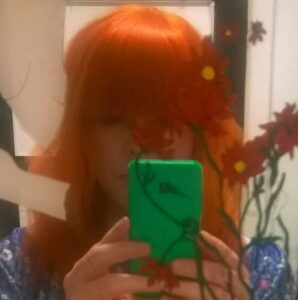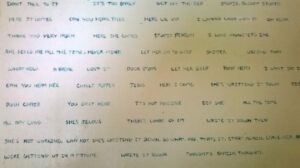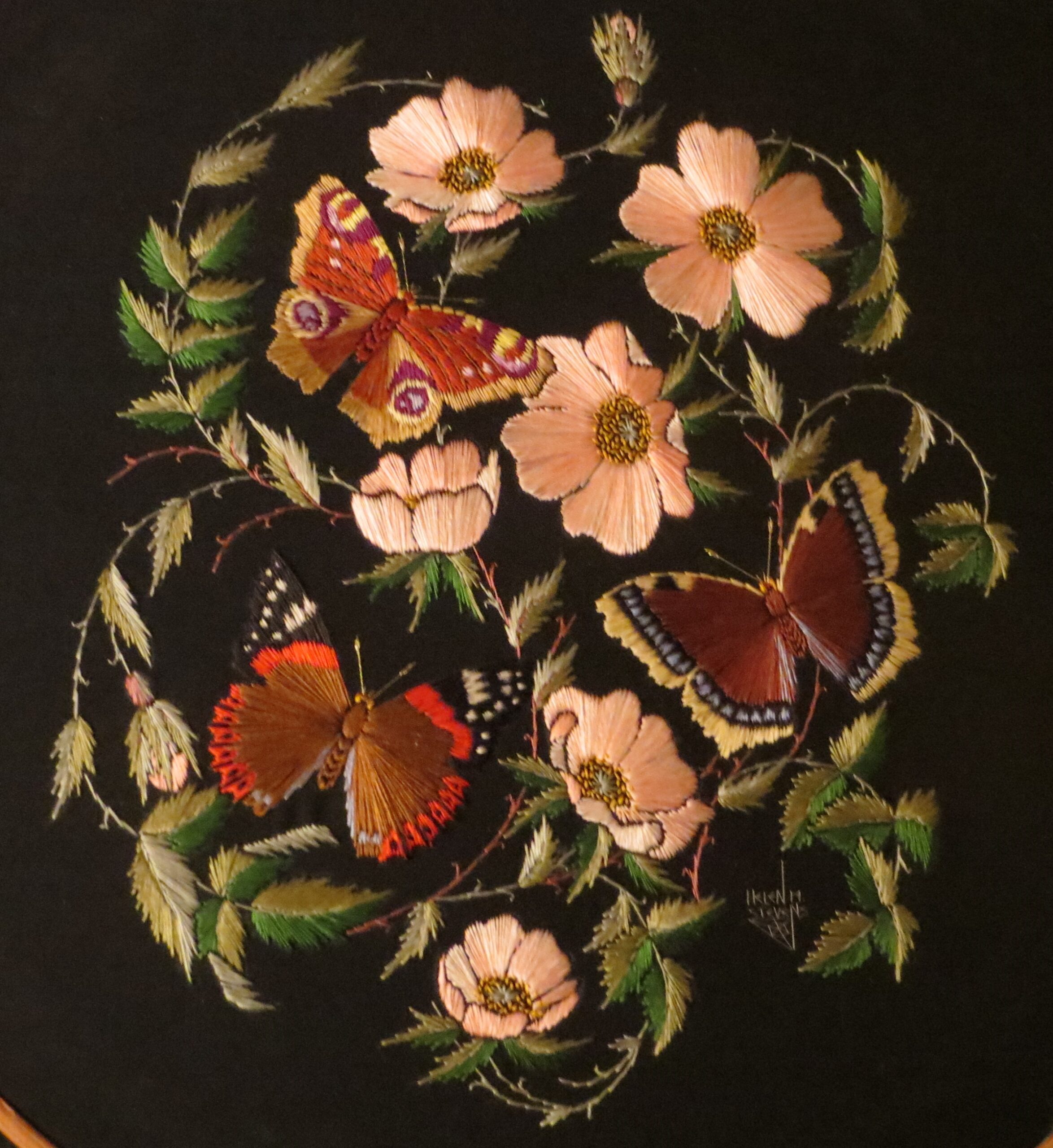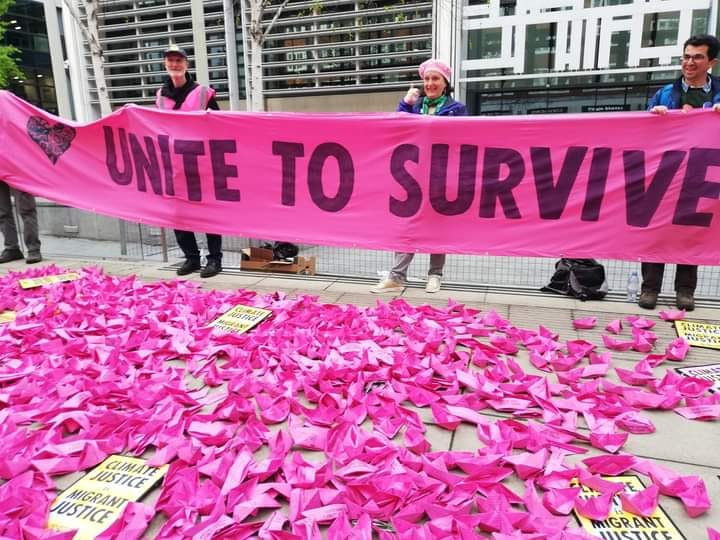
SELF-HELP AND RESILIENCE IN THE DEMOCRATIC REPUBLIC OF CONGO
I interviewed Bertin Kalimbiro from the Democratic Republic of Congo about his work in the Goma region to grow food safely and help people threatened


I interviewed artist Sharon Skipper about her experience as a highly creative individual facing mental health issues.
Leslie: When and how did your interest in creating art begin? How did it grow and develop?
Sharon: My dad was always the one behind my art since I was very young, I loved art from a very early age but stopped at the age of 16. I remember winning a competition in a magazine around 10 years old for clothes design and my dad showing it to everyone where he worked. He was very proud of me. I started a couple of years later after my dad’s death to draw again which was followed by paintings then I progressed later on to photography, collage and use of text from newspapers about life, my experiences and what others may think or feel, everything really…

Also I had ideas for installations and put my work forward for competitions. I had a studio in Hoxton where I exhibited. I wrote a book about text-based contemporary art, which took 6 to 8 months to write.
Leslie: You’ve also had mental health issues. Can you describe them in a way that helps people to understand your experience?
Sharon: At the end of writing the book I could feel myself starting to gradually fall apart, which then became voices and hallucinations. I continued my art through this madness with a lot of written art work. I’d write most of it down planning to accomplish something with it later in life. I went through schizophrenia for almost a year with no understanding that I had an illness and thought actually what I was going through was something real.
Leslie: When you hear voices, what’s it like? Are there strategies that can help?
Sharon: After a year a male voice from the bedroom door said, “She has schizophrenia.” I then looked it up and found out everything possible about the condition. I went on medication and I was then sedated with depression for six years. I completely lost interest in art and everything else. At the age of 35 I stopped taking my medication without letting my psychiatrist know. For two months I felt great, I was myself again and creating my art. I then started to hear a voice telling me to take my medication. My voices became full-on after I’d completed one of my paintings called The Relapse, I carried on with video work, more paintings, collages, and written art. This led to a stay in hospital.

Over the years I’ve tried numerous medications but have stuck to one for the past couple of years. My voices are good and bad. I have male voices, young and old which care and try to pull me through. The bad ones – well I don’t want to be the centre of their attention, or anyone else’s. I won’t give them the time of day. But when it’s bad it’s mental abuse which can last for days or even a few months. I do suffer quite severely at times, I tend to get on with it on my own without support, I have learnt to get through it by myself. There’s quite a lot of art in my good voices which come through and are very comforting. I’m still trying to find my strategies with my voices; it’s taking quite some time to learn this.
Leslie: In what ways has medical treatment been helpful and unhelpful, please?
Sharon:. We all need to find a balance. I don’t think we have enough say when it comes to medication. Patients know; doctors think they know. I’m not saying every doctor is like that, but they haven’t arrived at #EndTheStigma yet. There is a lot of ignorance about mental health, and the label sticks. We are judged when actually we are all the same, but struggling more than others.

Leslie: What’s your experience of the art world? Who are your artistic heroes – and why?
Sharon: I exhibit my work for the time being here on Saatchi online, where I’ve had many views. My experience of the art world is trying to put my feet forward and walking into it, but I’m normally falling. I do still enter for competitions and photography, along with written art. But I do believe that creativity in art and mental health can go together. To name a few examples: Richey Edwards from the Manic Street Preachers, who was a very good song writer and poet… and from art, Van Gogh, Mark Rothko, Agnes Martin... In Agnes Martin’s paintings you see calm, which she must have found from a place within her schizophrenia.. I hope I will be able to follow her into that place.
Next week, I ask artist and writer Jo Clutton about how she has rebuilt her life after thirty years of depression. Jo speaks with absolute honesty about her negative family, her loving husband and her numerous and eccentric interests.
ABOUT LESLIE TATE’S BOOKS:

I interviewed Bertin Kalimbiro from the Democratic Republic of Congo about his work in the Goma region to grow food safely and help people threatened

I interviewed computer expert and sustainability campaigner Dr Erlijn van Genuchten, who writes easy-to-understand books based on science full of practical suggestions for planet-friendly living.

I interviewed Canadian cartoonist Dawn Mockler about how she works on cartoons that might be environmental or wordless but always witty – especially her famous

I inteviewed Helen M Stevens about how she has revived the art of embroidery, creating original contemporary patterns while studying and drawing on, “One of

I interviewed Councillor Rachel Smith-Lyte about the origins of her passion for nature and her environmental activism. Rachel tells the story of her teaching (and
| Cookie | Duration | Description |
|---|---|---|
| cookielawinfo-checkbox-analytics | 11 months | This cookie is set by GDPR Cookie Consent plugin. The cookie is used to store the user consent for the cookies in the category "Analytics". |
| cookielawinfo-checkbox-functional | 11 months | The cookie is set by GDPR cookie consent to record the user consent for the cookies in the category "Functional". |
| cookielawinfo-checkbox-necessary | 11 months | This cookie is set by GDPR Cookie Consent plugin. The cookies is used to store the user consent for the cookies in the category "Necessary". |
| cookielawinfo-checkbox-others | 11 months | This cookie is set by GDPR Cookie Consent plugin. The cookie is used to store the user consent for the cookies in the category "Other. |
| cookielawinfo-checkbox-performance | 11 months | This cookie is set by GDPR Cookie Consent plugin. The cookie is used to store the user consent for the cookies in the category "Performance". |
| viewed_cookie_policy | 11 months | The cookie is set by the GDPR Cookie Consent plugin and is used to store whether or not user has consented to the use of cookies. It does not store any personal data. |
2 responses
Thank you for your honesty and for sharing your amazing artwork. May you continue to grow and develop your creativity. I have enjoyed reading the interview and know how important it is to be open about mental health. It Takes a lot of courage to speak out and to show who you are through the work that you do. All good wishes.
Thanks raine… Means alot.